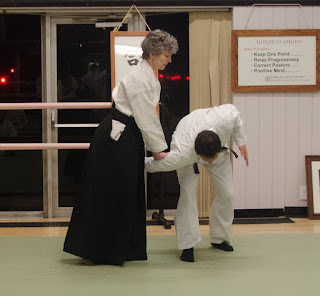Listening

When I meditate, it's pretty hard to keep from getting lost in my thoughts. One thing that helps a lot is to try very hard to just listen . I imagine that there's some very subtle sound I'm trying to hear, just barely at the limit of my ability to hear it. Sometimes I can become very aware and attentive. It struck me that this is a great thing to practice in general. So often, when playing music with others, or by myself, I'm generating thoughts, judgments, desires, remembering what just happened. It would be so much better if I could just listen. In my conversations with others, I've found I do the same thing: I start to generate a reply, or a judgment, or a reference, and suddenly I'm not listening anymore. I think the analogy extends easily to the martial arts, but in a more metaphoric way, in that I can learn to be more attentive to what is happening with the other person, instead of myself. It's not easy, but maybe with practice, I'll ge...



